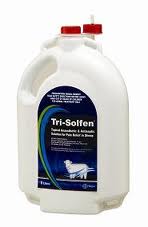A SHEEP pain relief product developed in Australia by Emergence client, Animal Ethics, has been approved for clinical trials for human use in the United Kingdom. Click here to read the full story!
The UK’s Medicines and Healthcare products Regulatory Agency (MHRA) has approved its application for a Phase IIa clinical trial of Tri-Solfen® (for human use the product will be branded as Medi-Solfen®) for the treatment of pain during the surgical debridement of venous leg ulcers.

Medi-Solfen® is an innovative medicine designed to provide rapid onset and both short and prolonged analgesia effects for up to 24 hours. The topical gel contains two local anaesthetic agents and an antiseptic, and other active ingredients, designed to minimise bleeding and potentially protect against infection as well as promote healing.
The Phase IIa clinical trial will assess the safety and efficacy profile of Medi-Solfen® in providing anaesthesia when applied topically to venous leg ulcers, prior to and post-surgical debridement.
“We are thrilled to announce the MHRA approval of our Phase IIa clinical trial design for Medi-Solfen® for the treatment of pain during the surgical debridement of venous leg ulcers. The application is based on an extensive body of evidence, which demonstrate the potential of Medi-Solfen® in providing a convenient, safe and effective method of pain mitigation in wounds and we look forward to investigating this further in venous leg ulcers, where there is a significant unmet patient need. This approval is an important milestone for Medical Ethics, with Medi-Solfen® being our first product candidate for human use progressed for clinical development and as we move towards building a proprietary wound care and pain mitigation platform.”
Allan Giffard, Managing Director of Medical Ethics
The open, randomised, parallel group-controlled study will be conducted in 90 patients in three successive stages, which aim to study the time taken to achieve surface anaesthesia, degree of post-operative pain relief and patient’s assessment of overall quality as an anaesthetic during this procedure.

Secondary objectives include the duration and quality of post-operative pain relief following a single-dose, levels of anaesthesia achieved, and influence on the early healing trajectory of the leg ulcer.
Patients with venous leg ulcers report pain to be the worst aspect of having an ulcer, especially during debridement.1-4 Pain tolerated over a long time can cause a negative mood, decreased activities of daily living, sleep disturbance, reduced mobility and social withdrawal.5 In the UK alone, there are 278,000 venous leg ulcers being treated per annum, plus an additional 420,000 leg ulcers with no specific classification, however, it is broadly accepted that a number of these are venous in origin.6
